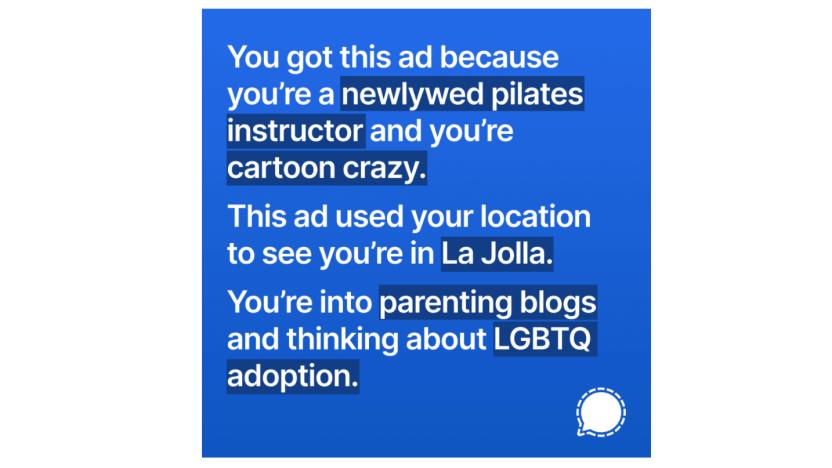targeted advertising
Latest

Signal tried to use Facebook's targeted advertising data against it
Signal is accusing Facebook of disabling its ad account after it tried to expose its ad targeting practices.

Recommended Reading: Painful memories the algorithms won't let you forget
Recommended Reading highlights the week's best long-form writing on technology and more.

Oculus is rolling out its expanded social VR features
Along with Quest hand tracking, one of Facebook's big announcements at Oculus Connect 6 in September was a batch of social VR features. You'll get to try them over the coming days, as Oculus is starting to roll them out.

Google to settle YouTube child privacy violations for up to $200 million
Google will allegedly pay between $150 and $200 million to end the FTC investigation into whether YouTube violated a children's privacy law, Politico reported this afternoon. The FTC reportedly voted along party lines (3-2) to approve the settlement, which will now be reviewed by the Justice Department.

Scientists used phone accelerometer data to predict personality traits
Our phones contain a disturbing amount of information about us. While calls, messages, app usage and location logs have all been used to profile users, phone accelerometers contain key information, too. Researchers from the Royal Melbourne Institute of Technology (RMIT) University used the tiny sensors that track phone movement for things like step-counting to predict five key personality traits.

Nielsen wants to track podcast data by... calling people
Are true crime podcasts as popular with Millenials as they are with Baby Boomers? Does the under-35 crowd listen to wellness podcasts? Nielsen, the company behind the TV ratings system, will begin to survey Americans about their podcast consumption habits in order to sell the data to podcast creators and ad networks.

Facebook will be liable for future Cambridge Analytica-style scandals
Facebook is updating its terms and conditions after agreeing several changes with the EU. It will have to clearly explain to users they can access the social network for free because it uses targeted ads that rely on user data. Facebook will also have to disclose what revenues it generates through the use of such data.

Senate bill proposes stricter privacy controls for children
Some politicians don't believe the Children's Online Privacy Protection Act does enough to protect kids in the modern era, and they're hoping to update it accordingly. Senators Ed Markey and Josh Hawley have introduced a bill that would amend COPPA with stricter controls on kids' data. It would ban ads targeted at kids, and would require an "Eraser Button" that would let kids and parents wipe data. The measure would still ban the collection of personal data for kids under 13 without their parents' consent, but it would also ban collecting data from the 13- to 15-year-old crowd without the user's permission.

Sky's AdSmart brings targeted advertising to your TV
As it turns out, Sky isn't prepared to sit and watch while its business gets trashed by Google and chums. To get in on the targeted-advertising game, the broadcaster is launching a new platform on its UK set-top boxes, called AdSmart. The system works by sending a library of clips direct to your Sky+HD box, which will run during ad breaks in live broadcasts in place of the standard national ads transmitted to everyone else. So, while the rest of the country is being sold nappies, you could be watching a pre-downloaded ad for a new phone, for instance. The targeting might not be totally precise, however, because we're told that the only information Sky has access to is your post code and Experian's records, but hey -- perhaps you'll be clued-in when your local restaurant begins offering a new menu.

Google to pay $22.5 million to settle FTC charges over tracking cookies in Apple's Safari browser
Google has agreed to pay a $22.5 million penalty to settle its dispute with the FTC, over the company's role in bypassing browser settings in Apple's Safari web browser. Although it stated that it wouldn't use tracking cookies or targeted ads in the web browser, a loophole was discovered, violating a previous privacy settlement between the FTC and Google. According to the commission, the company exploited an exception in the browser's default settings, adding a temporary cookie that could temporarily open up access to all cookies from the DoubleClick domain. While the exploit was patched by Google, for a limited time, it was able to track Safari users that had explicitly opted out. The FTC's full statement is right after the break.

Microsoft patent application could match online moods with emotionally-targeted ads
It's a match made in marketing heaven: users let their guards down within the internet's virtual walls and ads are served up to complement their fickle mental states. At least, that's one possible version of your hyper-targeted digital future, if a patent application, filed by Microsoft back in December of 2010, is any indication. The USPTO documents outline a system wherein users' online activity would be monitored and associated with a corresponding tone, their reactions recorded and an overall emotional state affixed to that behavior. This information, once properly indexed, would then be fed into a large database containing user-identifiable emotional profiles used to deliver mood-specific ads. Clearly, this proposed endeavor all but screams privacy concerns and begs the inclusion of a giant, blinking opt-out clause. Color us paranoid, but we'd rather not see the day when our PCs know we're having a particularly gloomy Sunday.

Agile Route's Shopper Tracker brings Kinect hacks, Google Analytics to the grocery aisle (video)
The Shopper Tracker is one of those devices that does exactly what its name suggests -- and so much more. Developed by Argentina's Agile Route, this Kinect hack uses an array of heat sensors and 3D spatial recognition software to track a consumer's movements and behavior within any brick and mortar retail outlet. These data can then be used by a store owner to find out which shelves and items are appealing to customers, effectively adding a Google Analytics-like dimension to their product displays. The system is also capable of tracking multiple people at once, and can even provide feedback on which products consumers actually pull from the shelves. According to the company, this type of analysis can result in obvious strategic benefits for merchants, while reminding the rest of us that we're totally predictable. Check it out in action, after the break.

Verizon begins collecting user data for targeted ads, is kind enough to offer 'opt-out' escape route
Verizon still wants to collect your personal information, but it'll understand if you decide to opt out. Really, it's cool. No hard feelings. The provider said as much yesterday, in an e-mail titled "Important notice about how Verizon Wireless uses information." The missive, sent to all VZW customers, essentially lays out the company's revamped privacy policy, originally unveiled last month. Under the new framework, Verizon will be able to monitor your browsing history, location, app usage, and demographic data, all in the name of targeted advertising and vaguely-titled "business and marketing reports." The good news is that you can always opt out of the scheme, either by phone or online. The bad news is that you'll probably have to explain the whole thing to your grandma.

Disconnect browser extension keeps pesky cookies in check, blocks third-party tracking requests
Internet Explorer 9 may block 'em in 2011, and the US government's on the case too, but you don't have to wait for Microsoft or bureaucracy to keep your privacy paramount if you browse with Rockmelt or Chrome. That's because former Google developer Brian Kennish just released Disconnect, an extension for either one, that banishes Digg, Facebook, Google, Twitter and Yahoo tracking requests (more companies are on the way) as you make your merry way across the web. Install and you'll find a nice little "d" icon on your browser's status bar, with a drop-down menu exposing exactly how many requests you've blocked from each service, and the option to manually disable blocking at will. Why bother? Don't you want to keep that secret love of Thanko products all to yourself?

Internet Explorer 9 privacy measures to include Tracking Protection
In a nod to future FTC mandates regarding web privacy, Microsoft has announced that among its many charms, Internet Explorer 9 will introduce something called a Tracking Protective List. In essence, the TPL looks at third party elements of whichever page you may be viewing (for instance, when you're at msnbc.com and it contains elements that are hosted by another domain) and allows you to block those which track your movements. This is done by domain, and there is both a whitelist and a blacklist -- ensuring that while elements that are required for full functionality will be allowed, those which are a nuisance will be blocked. Of course, this isn't the answer to all of your security needs, but between this and properly managing your cookies it is a decent first step. IE9 will come around sometime in early 2011 -- in the meantime, check out the video after the break for more info.

FTC wants to fight tracking cookies with other cookies, create delicious sugary warfare
We're not sure that fighting fire with fire actually works outside of the metaphorical realm, but don't let us tell the FTC how to do its thing. The federal body, which recently told Google "it's all good" after the company apologized for stealing people's private infos, is now asking for social networking sites and browser developers to create a sort of "do not track" cookie system. If this cookie was present the sites would not capture a user's browsing habits and not deliver customized ads, a cookie that would be created and enabled by a simple browser button. As of now the FTC is not mandating anything, but did deliver this passive-aggressive threat: With respect to 'do not track,' we are giving companies a little time, but we'd like to see them work a lot faster in making consumer choice a lot easier. So there you have it: start playing nice, companies, or the FTC might possibly do something. Meanwhile, we might possibly eat the cute looking gingerbread man in the middle up there. He sure looks tasty. [Image courtesy of Fagles]

Microsoft exec caught in privacy snafu, says Kinect might tailor ads to you
Microsoft's Dennis Durkin voiced an interesting idea at an investment summit last week -- the idea that the company's Kinect camera might pass data to advertisers about the way you look, play and speak. "We can cater what content gets presented to you based on who you are," he told investors, suggesting that the Kinect offered business opportunities that weren't possible "in a controller-based world." And over time that will help us be more targeted about what content choices we present, what advertising we present, how we get better feedback. And data about how many people are in a room when an advertisement is shown, how many people are in a room when a game is being played, how are those people engaged with the game? How are they engaged with a sporting event? Are they standing up? Are they excited? Are they wearing Seahawks jerseys?Needless to say, sharing this level of photographic detail with advertisers presents some major privacy concerns -- though it's nothing we haven't heard before -- but moreover it's explicitly against the privacy policy Microsoft presents Kinect users. "Third party partners use aggregated data to deliver Kinect experiences (games or applications), to understand how customers use their Kinect experiences, and to improve performance or even to help plan new experiences," the Kinect Privacy and Online Safety FAQ reads, but also "They are not permitted to use the information for marketing purposes such as selling you games or services, or for personalizing advertising" (bolding ours). In an email to the Wall Street Journal, Microsoft flatly denied that the Kinect would do anything of the sort, whether via third-party partners or otherwise. "Xbox 360 and Xbox LIVE do not use any information captured by Kinect for advertising targeting purposes," representatives wrote. Honestly, some of us at Engadget still think targeted advertising is kind of neat, but we know how seriously you take this stuff.

HP and Yahoo team up to deliver targeted ads... to printers
Seriously. To be specific, the two companies are working on delivering targeted ads to HP's web-connected printers, and the ads would apparently only show up when you use HP's "scheduled delivery" service to have portions of a newspaper or magazine printed every morning. To make those ads as targeted as possible, HP says the printers would employ IP sniffing to help pin down your location, and the company says that the ads could also be targeted based on "user's behavior as well as the content" -- although it's quick to point out that everything must be done with privacy in mind. Will folks mind having ads encroach on their own printed materials (not to mention printer ink)? Not according to HP's Stephen Nigro, who says that HP has discovered "that people were not bothered by it," and that part of its belief is that "you're used to it. You're used to seeing things with ads."

Comcast Spotlight to pinpoint customer desires with targeted ads
Comcast is rolling out its Spotlight program in Baltimore in Q3 of this year. There's a scary threesome involved in the effort: Comcast, media agency Starcom MediaVest Group and technology partner Invidi. Central to the program is Invidi's Advatar technology (no, not that Advatar) to deliver ads targeted to individual users. Before you get too scared by the "Big Brother" sound of all this, consider that Comcast's initial trial of addressable placements showed 38% less ad-skipping; that's a pretty good indication that people preferred the ad flavor cooked up by Comcast. Let's face it -- in conventional broadcasting (and increasingly online as well), advertising is a proven model. So programming is going to be sprinkled with ads; wouldn't you rather have them be personally interesting? We certainly prefer this to the "run the ads louder" approach. The real tricky issue will be maintenance of anonymity; we'll see how consumers respond as TV increasingly watches them. All companies involved would be wise to keep in mind the cost of winning back violated customer trust.

Microsoft envisions invasive approach to targeted advertising
Not that getting all up in our proverbial grills in order to provide specialized advertising is a new concept or anything, but Microsoft in particular has been on the warpath of late in this very realm. On the heels of a similar ad-based patent application comes documentation that reveals plans to use "biometric sensors, cameras, remote controls, or other accessories" to detect and identify an individual before doling out targeted plugs. Yes, this certainly does insinuate that your television would be watching you just as often as you viewed it, but unless it becomes lawful to stuff monitoring devices into our homes for the benefit of marketers, we'll consider ourselves safe -- for the time being.[Via TechDirt]












